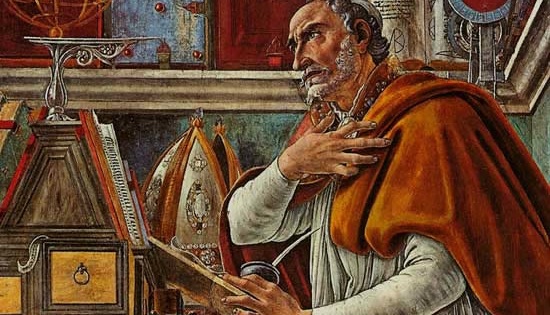Portrait of a World-Changer
Series | Repentance
 Sandro Botticelli’s first major fresco commissioned in 1480: Saint Augustine
Sandro Botticelli’s first major fresco commissioned in 1480: Saint Augustine
Augustine of Hippo may be the most important man in church history. German historian, Adolf Harnack, called him the greatest man “between Paul the apostle and Luther the Reformer, the Christian church has possessed” (quoted in Piper, The Legacy of Sovereign Joy, 24).1 Of course, Martin Luther was an Augustinian monk for many years, and my personal hero, John Calvin, quoted Augustine no less than 342 times in the fifth and final edition of his Institutes of the Christian Religion. B.B. Warfield summarized Augustine’s impact as follows:
His direct work as a reformer of Church life was done in a corner, and its results were immediately swept away by the flood of the Vandal invasion…[but] it was through his voluminous writings, by which his wider influence was excited, that he entered both the church and the world as a revolutionary force, and not merely created an epoch in the history of the Church, but has determined the course of its history in the West up to the present day. (quoted in Piper, 24-25)
We owe much of our thinking and theology to Augustine, in particular, “our developed anthropology and soteriology, [and] our understanding of the Bible’s teaching on the relations between human sin and divine grace” (Nick Needham, “Augustine of Hippo: The Relevance of His Life and Thought Today”, SBJT 12/2 SUMMER 2008, 39). We stand downstream in the torrent of his teaching on original sin and the sovereignty of God.
There are a few reasons, however, that understanding his life and thought is difficult for us. First, Augustine lived from AD 354-430, so we are removed almost 1600 years from his culture, language, and experience.
Not only is the time gap difficult to jump, but also the mountain of his writings makes for a grueling climb. Few can claim to have read everything written by him, and none can claim to have read everything written about him. There are more than five million words in his recorded works (especially remarkable considering he had no electricity, let alone a computer). There are almost 600 words in this post, so it would take over 8,333 posts pasted together to reach five million words. Benedict Groeschel, a Catholic historian, wrote an introduction to Augustine’s life and said,
I felt like a man beginning to write a guidebook of the Swiss Alps….After forty years I can still meditate on one book of the Confessions…during a week-long retreat and come back feeling frustrated that there is still so much more gold to mind in those few pages. I, for one, know that I shall never in this life escape from the Augustinian Alps. (quoted in Piper, 45).
The other difficulty is that, among those five million words, we find numerous contradictions, including some teachings that we would say are clearly unbiblical. I hate, for example, Augustine’s allegorical interpretation of numerous Old Testament passages (his approach to Genesis narrative is atrocious). Worse than his hermeneutic, Augustine seems to have attributed special, or sadly, even saving power to baptism. We do not agree with him here at all.
But for all that, I am convinced, now more than ever, that we need Augustine for our souls and for our churches, which in turn would change our world. I’ll explain why I think he’s so helpful and try to make my case as we follow two lines of thought in the following posts: the chronology of his life and the confessions of his life.
- A free PDF download of this book is available here. The book also includes chapters on Luther and Calvin. It is currently #8 on my list of books that influenced me the most. The original manuscript and audio of Piper's biography on Augustine is available here.↩